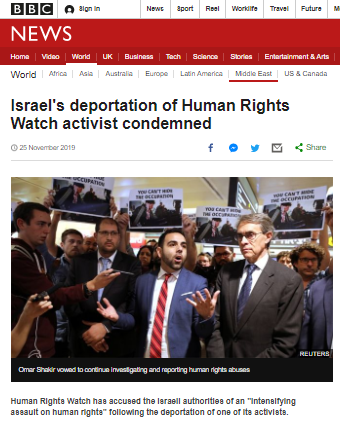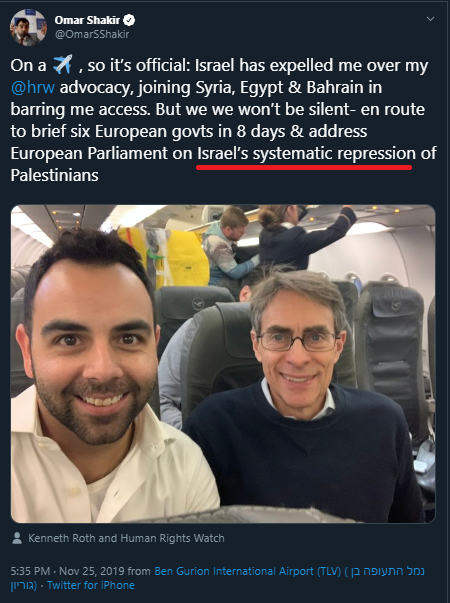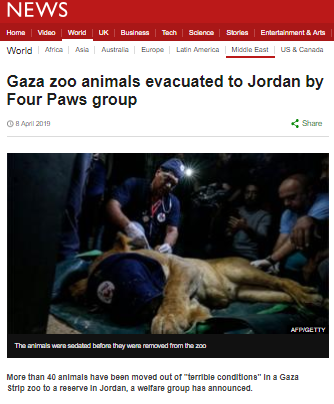On the afternoon of November 25th the BBC News website published a report headlined “Israel’s deportation of Human Rights Watch activist condemned”.
With not much having happened since the BBC published its previous article on that story twenty days earlier (except for the Supreme Court’s rejection last week of another petition from HRW), it came as no surprise to see that a significant proportion of this latest report was identical to the earlier one – including the links to additional reading.
As was noted here the last time those links were promoted:
“The first of those items promotes the falsehood that the BDS campaign solely relates to a “cultural boycott” of Israel. The second is remarkable for its lack of fact checking and the third (from 2015) uncritically amplifies falsehoods promoted by a professional BDS campaigner, including about the campaign’s origins.”
This latest report yet again made no effort to give BBC audiences an accurate picture of the anti-Israel BDS campaign in the corporation’s own words.
“Israel says that BDS opposes the country’s very existence and is motivated by anti-Semitism – something the movement denies.”
It did however once again uncritically amplify HRW’s talking points concerning the case.
“HRW rejected the Israeli government’s portrayal of Mr Shakir, saying he neither supported nor opposed BDS.
It stressed that as its representative he had called on companies to stop working in or with Jewish settlements in the occupied West Bank, and had not called for a consumer boycott of those companies.”
Remarkably, no effort was made to inform readers of the court findings which refute those talking points.
Readers of course found the BBC’s standard partisan portrayal of ‘international law’.
“The settlements are widely considered illegal under international law, though Israel disputes this.”
Twenty-one percent of the report’s word count was devoted to uncritical amplification of the latest statements from the political NGO ‘Human Rights Watch’.
“Human Rights Watch has accused the Israeli authorities of an “intensifying assault on human rights” following the deportation of one of its activists. […]
“Israel today joins the likes of Venezuela, Iran, and Egypt in barring Human Rights Watch researchers, but it, too, will not succeed in hiding its human rights abuses,” said Kenneth Roth, HRW’s executive director, who accompanied Mr Shakir as he flew out of Tel Aviv’s Ben Gurion airport on Monday.
“This decision shows why the international community must reboot its approach to Israel’s deteriorating human rights record. A government that expels a leading human rights investigator is not likely to stop its systematic oppression of Palestinians under occupation without much greater international pressure.””
An additional paragraph was given over to amplification of similar comments from another political NGO which engages in lawfare against Israel, ‘B’tselem’ and yet another paragraph (also seen in the previous report) told readers that:
“Former Israeli officials and human rights groups filed motions to join Mr Shakir’s appeal against the deportation order at the Supreme Court, while the European Union and United Nations Secretary General António Guterres called on the Israeli authorities not to deport him.”
BBC audiences were not however informed that among those expressing support for Omar Shakir and ‘Human Rights Watch’ was Hamas.
While the caption to the main image illustrating the article told BBC audiences that “Omar Shakir vowed to continue investigating and reporting human rights abuses”, both a Tweet from Shakir embedded into the article and a Tweet from the head of HRW make it very clear that the NGO’s interest in human rights is far from universal.


This is the third BBC News website report on this topic (see earlier ones here and here) and all three have extensively and unquestioningly amplified the talking points of HRW and other political NGOs while failing to inform BBC audiences of the obviously relevant issue of the aims of the BDS campaign.
Clearly the BBC has no interest whatsoever in providing its audiences with the full range of information necessary for proper understanding of the story and its wider related background but that editorial policy is more comprehensible when one appreciates that while for years ‘Human Rights Watch’ has been one of the political NGOs most quoted and promoted by the BBC in its coverage of Israel, that organisation’s political agenda and funding has never been adequately clarified to audiences as required by BBC editorial guidelines on impartiality.
Related Articles:
BBC News website amplifies the NGO echo-chamber
BBC News report uncritically amplifies political NGO’s talking points




